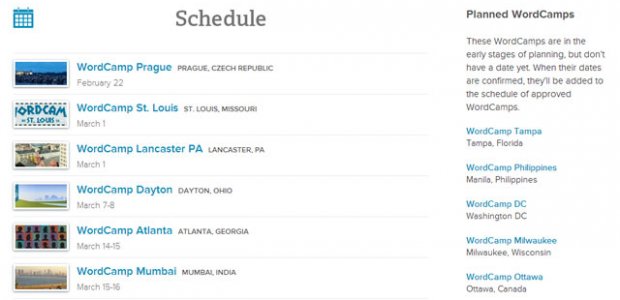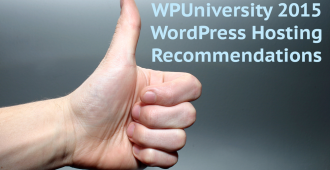This is part our series on organizing WordCamps. Check out Getting Involved: WordCamp Organizing 101 for the full series. If you’re an organizer with advice to share, or a potential organizer with questions to ask, please get in touch with us!

You can plan the best WordCamp in the world, but if nobody knows about it, what’s the point? You need to get the word out and let people know what’s going on.
Here’s what’s worked for us in the past. Think of it as a supplement to the WordPress Planning Guidelines page on Publicity.
Getting The Point Across
Whether you’re talking to someone or designing a poster, keep this in mind:
You have a very short amount of time to build interest.
So tell people what the event is about and lead them to your site for more information. Key points:
- Name of the event: What are people searching for?
- Location: Venue name or nearby major intersection/landmark.
- Dates.
- A couple of sentences about the event.
- Ticket price.
- Website URL.
So, using our WordCamp from last year as an example:
- WordCamp Toronto 2013
- at Humber College
- October 5-6
- Join us for a Weekend of WordPress at Humber College Lakeshore Campus! Two days of sessions, workshops, and panels dedicated to all things WordPress – the world’s most popular CMS.
- Tickets are only $30 for the entire weekend, including catered breakfast and lunch.
- Visit 2013.toronto.wordcamp.org for full details & registration.
Online Promotion
Use WordCamp Central & Other WordCamps
- Your event will be listed on the WordCamp Central site. e.g.) WordCamp St. Louis 2014.
- Create a banner (926px*160px). Central will use this in your listing.
- Put together a couple of paragraphs about your camp. Elaborate on Point #4.
- Contact organizers of other WordCamps in your region, ask for a shout-out on their site.
Set Up Social Media Profiles
- Register social media accounts with your city’s @wordcamp.org email address.
- Link back to your official WordCamp site from the profiles, and link to the profiles from your site.
- Use a standard hashtag. You can then aggregate tagged updates using a tool like Tagboard.
Create Website Badges
- Create badges for attendees, volunteers, speakers, sponsors, organizers.
- Instruct people to link the badges back to your camp’s website.
- Share the badges on your site along with HTML code for people to copy/paste.
- Examples: Website badges from WordCamp Calgary and Ottawa.
Contact Local Media
- Local news sites and blogs.
- Community newspapers, e.g. dailies or weeklies.
- Remember: Your WordCamp is a community event, not a conference or tradeshow.
Offline Promotion
Contact Local Meetup Groups
- Contact the organizers of groups that are dedicated to relevant topics, e.g. web development.
- Attend local meetups and events, let people know what’s happening.
- Encourage your volunteers to do the same.
Nice-to-Have: Print (Postcards, Flyers, Posters & Business Cards)
Print is a nice-to-have if you’re lucky enough to get some in-kind sponsorship from a printer. Business cards are probably the most useful because they’re relatively inexpensive and very portable.
- Put posters on community boards in places like coffee shops, libraries, coworking spaces.
- Some small businesses will let you leave postcards in a designated spot, usually near the counter.
- Give posters, flyers, and postcards to volunteers so they can help distribute them.
- Business cards are a small, convenient leave-behind for when you meet people in person.
If you have a print sponsor, try to include signage: it’s not promotion-related, but it’s extremely helpful during the event itself.
